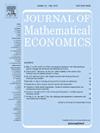An economic theory of the Soviet system
IF 0.7
4区 经济学
Q3 ECONOMICS
引用次数: 0
Abstract
The sudden collapse of the Soviet regime is one of the most enigmatic historical events explored in the social sciences. In this paper, we propose a macrodynamic theory of the Soviet economy that provides theoretical foundations for understanding its collapse. Our model features three actors: workers (the people) who can revolt, natchalnik (the supervisor of firms) who controls a defense-industry firm, and the apparatchik (a member of the communist party and administration) who both extracts production for personal uses and acts as a central planner. We analyze the conditions for the Soviet regime’s sustainability or collapse. Our theory identifies three channels leading to the collapse: internal contradictions within the elite, conflicts between the workforce and the administrative-command structure, and corruption among the elite.
苏联体制的经济理论
苏联政权的突然垮台是社会科学研究中最神秘的历史事件之一。在本文中,我们提出了苏联经济的宏观动力学理论,为理解其崩溃提供了理论基础。我们的模型以三个角色为特征:可以反抗的工人(人民),控制国防工业公司的natchalnik(公司的监督者),以及既榨取生产供个人使用又充当中央计划者的官员(共产党和行政部门的成员)。我们分析了苏联政权维持或崩溃的条件。我们的理论确定了导致崩溃的三个渠道:精英内部的矛盾,劳动力与行政命令结构之间的冲突,精英内部的腐败。
本文章由计算机程序翻译,如有差异,请以英文原文为准。
求助全文
约1分钟内获得全文
求助全文
来源期刊

Journal of Mathematical Economics
管理科学-数学跨学科应用
CiteScore
1.70
自引率
7.70%
发文量
73
审稿时长
12.5 weeks
期刊介绍:
The primary objective of the Journal is to provide a forum for work in economic theory which expresses economic ideas using formal mathematical reasoning. For work to add to this primary objective, it is not sufficient that the mathematical reasoning be new and correct. The work must have real economic content. The economic ideas must be interesting and important. These ideas may pertain to any field of economics or any school of economic thought.
 求助内容:
求助内容: 应助结果提醒方式:
应助结果提醒方式:


